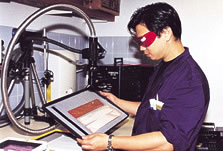|

Computer
databases that can store and retrieve fingerprints at the press of a
buttom allow detectives to match prints speedily.
|
Design
of the Third Generation Command and Control Communications (CC3) project
is progressing well. The system, which will employ sophisticated and
advanced technology to provide all patrol officers with digital
communication facilities, is targeted to go fully live in the summer of
2005.
Following completion of a feasibility study into the Force fixed telephone
communications network, detailed planning and design for the next
generation Integrated Fixed Communications System will commence shortly.
Information
Technology
The
first eight projects started under the new ISSP include several that will
have a direct impact on day-to-day operations such as the ticketing and
summons process, bringing a number of improvements.
Information
security was reinforced during 2000 through a Software Asset Management
Audit and review of security procedures.
In December, the Central Helpdesk, set up in 1997 to provide 24-hour
support services for all Force's systems, was awarded ISO 9001
accreditation by the Hong Kong Quality Assurance Agency (HKQAA) in
recognition of the internationally accepted level of service that it
provides. The desk dealt with 70 000 problem reports in 2000 and currently
handles over 12 000 incoming calls a month.
By the end of 2000, the Force had developed over 90 information technology
applications and installed 10 000 computers.
Business
Services
Business
Services Bureau co-ordinates the business needs of the five Departments of
the Force. It consists of two Business Services Divisions, 'ePOL' Division
and the Business Development and Research Unit. Business Services has a
client-focused account management system to deal with the Departments.
Business Services Divisions ¡X One of the key themes of the
Commissioner's Strategic Directions is effective technology support and
deployment. The Divisions play an important role in working pro-actively
with business functions and in programme areas to develop effective
information technology-enabled business solutions.
ePOL Division ¡X co-ordinates Force's strategy with regard
to the internet, the POINT and electronic services. It aims to bring as
many police services on-line as feasible, provided that the benefits
gained from such services justify the cost. On POINT, that means bringing
information and services directly to police officers, whilst on the
internet, it means bringing services directly to the public. In addition
to delivering internet access via users' computers, other avenues are also
being examined, such as public interactive kiosks, which are currently
installed in all Police report rooms. The recently re-launched Police web
site, which allows reports to be made over the internet, was the first
Government site to offer electronic services to the public in Hong Kong.
Business Development and Research Unit ¡X The unit's
current main responsibility is to determine who needs to have a networked
computer to meet operational requirements. Given the rapid adoption of
information technology support systems, all Superintendents and civilian
equivalents, and above, and all 'functional heads' (essentially all
Inspectorate officers and their civilian equivalents, and above, but
including such junior officers as are functional heads) in the Force are
being supplied with a desktop computer connected to the PDN, with e-mail,
internet and POINT access. Machines installed in police station resource
centres and duty rooms will be capable of accessing POINT and the
internet, substantially increasing the channels of communication within
the Force.
Service
Quality Wing
High
priority is attached to achieving a culture of service within the Force,
where every task is measured in terms of quality and continuous
improvement. Spearheading this drive is the Service Quality Wing, whose
various initiatives are described in Chapter One ¡X 'In Pursuit of
Excellence'
|